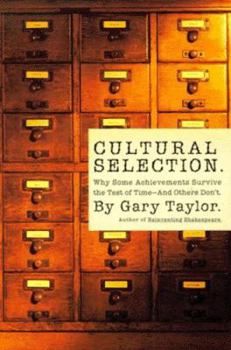Cultural Selection: Why Some Acheivements Survive the Test of Time and Others Don't
Select Format
Select Condition 
Book Overview
Acclaimed literary scholar Gary Taylor creates a new paradigm for understanding cultural history. He argues that culture is not what was done, but what is remembered and that the social competition... This description may be from another edition of this product.
Format:Hardcover
Language:English
ISBN:0465044883
ISBN13:9780465044887
Release Date:April 1996
Publisher:Basic Books
Length:336 Pages
Weight:1.40 lbs.
Dimensions:1.1" x 6.4" x 9.5"
Customer Reviews
2 ratings
A superb sleeper on the subject of cultural evolution.
Published by Thriftbooks.com User , 24 years ago
Gary Taylor brings a vibrant cultural sensibility to the field of cultural evolution. Lately the speculative field of memetics born from seeds planted by biologist Richard Dawkins has "rocked the charts" in efforts to bridge the chasm between biology and culture. I think Gary Taylor brings a balancing culturally well grounded sense to this picture. The history of memory, rather than memes, provides the string which ties this work together. He starts off with Stonehenge and progresses through an exciting array of cultural artifacts, literary, political, artistic etc., which spans both western and eastern culture with a depth of understanding of an accomplished cultural scholar. By the time I finished, I felt as though I had wandered through a spellbinding museum.His understanding of the nuances of evolution as revealed in the biological sciences proves considerable. His intuitions about analogizing those concepts to cultural artifacts show considerable refinement and understanding. Students of the hard sciences will appreciate the respect that he has for those fields. Thankfully his work emerges free and clear of the pretensions and condescensions which cultural scholars more closely identified with postmodernism have often notoriously displayed in dealing with scientific matters. His presentation also proves very accessible. Anybody with a basic understanding of evolution and layman's enjoyment of fine culture should have no problem understanding and enjoying this book.For those already familiar with the memetics frame of reference, his elucidation of the role of the editor, the "invisible man" meshes very well with ideas of ideal replication outlined by Susan Blackmore in "The Meme Machine." Here we understand that the truest replication of memories remains far more elusive than simply hitting the button on a photocopier. We must replicate the message (or as Blackmore would say the instructions) rather than just the product, and doing so requires that we consider how much of the message relies on its initial context and how to recreate those same messages in an entirely different context. The truest replications of the message (more than just words, images, or sensations) requires far more work than the recipient will ever appreciate if the editor does the job right. Ironically the editors that we most notice, we usually notice because they lacked in the job of providing that transparency for the replication of the message. Other insights abound in analysis of the various elements of representation, the role of niches and niche behaviors.This book so far has not received the popular attention which its quality seems to deserve. I think this more reflects the shallowness of our hype driven culture. Discover this book. It is a treat to the intelligent and inquisitive mind that appreciates a depth of understanding.Very thorough index to works cited at the end.
Approaching Cultural Evolution from the Cultural Side
Published by Thriftbooks.com User , 25 years ago
I found Gary Taylor's grasp of evolutionary thinking to be firm and clear. Students of cultural studies can benefit from his insights on evolutionary patterns and how they can be applied to cultural phenomena. His analysis of representation, its purposes, its nature, and its limitations and its dependence on the role of editors is illuminating. This would be a benefit students of evolution as they forge into the fields of cultural studies looking for orientation in this new environment.The depth of his familiarity with both western and eastern cultures would be very helpful to people with more hard science training who are still catching up with their humanities education. In this respect his style is approachable and lacks a lot of the pointless elite pretentiousness that I have encountered in other cultural scholars.Oddly enough, I found no references in his book to some very timely ideas about cultural evolution proposed by both Richard Dawkins and Daniel Dennet. Perhaps he is unaware of these recent developments amongst theoretical evolutionists on the other side of the cultural evolution equation. Or perhaps he knows his niche too well, and is aware of the brutal treatment such ideas would recieve at the hands of more elitest cultural scholars. I found Mr. Taylor's work to be well in step with these unspoken ideas.If you like his book, you may enjoy looking into this other field. It would go far toward finishing the theoretical framework which Mr. Taylor has begun. If you are already immersed in evolutionary thinking, Mr. Taylor's work is a very approachable invitation by a knowlegeable inhabitant of the cultural world.





